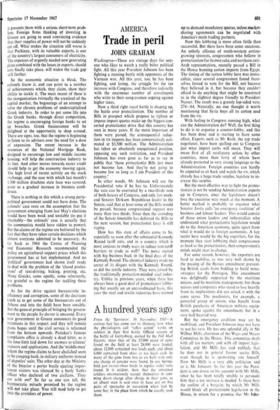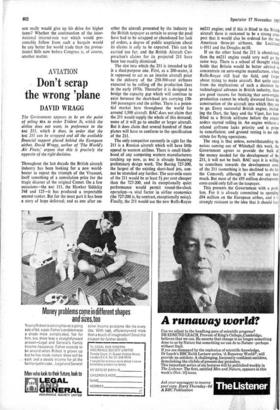Trade in peril
AMERICA JOHN GRAHAM
Washington—These are vintage days for any- one who likes to watch a really bitter political fight. All this year President Johnson has been fighting a running battle with opponents of the Vietnam war. All this year, too, he has been fighting, and losing, the struggle for the tax increase with Congress, and therefore indirectly with the enormous number of constituents who write to their congressmen arguing against higher taxes.
Now a third right royal battle is shaping up, the battle over protectionism. The number of Bills in prospect which propose to tighten or impose import quotas make up the biggest con- certed protectionist drive that this country has seen in many years. If the more important of them were passed, the consequential reduc- tion in us imports has been conservatively esti- mated at $3,500 million. The Administration has taken an absolutely unequivocal position, opposing any such restriction, and President Johnson has even gone as far as to say in public that 'those protectionist Bills just must not become law. And they're not going to become law so long as I am President of this country.' -
In other words, Mr Johnson will use the Presidential veto if he has to. Unfortunately the veto can be overruled by a two-thirds vote of both houses of Congress, and only last week- end Senator Dirksen. Republican leader in the Senate, said that at least some of the Bills would be passed, because congressional support was more than two thirds. Since then the crowding of the Senate timetable has deferred the Bills to the next session, but protectionist fever is still raging.
How has this state of affairs come to be, especially so soon after the substantial Kennedy Round tariff cuts, and in a country which is most anxious to study ways to reduce non-tariff barriers to trade as well? The move started with big business back in the final days of the Kennedy Round. The chemical industry made no secret of its disgust with the Kennedy Round, as did the textile industry. They were joined by the traditionally protection-minded steel indus- try. Unlike in previous years, when there has always been a good deal of protectionist lobby- ing but usually on an uncoordinated basis, this year the steel and textile industries have teamed
up to demand mandatory quotas, unless market- sharing agreements can be negotiated with America's main trading partners.
Now this lobbying is more often futile than successful. But there have been some successes. An unholy affiance of south-western cotton- growing interests, congressmen who believe in protectionism for its own sake, and northern anti- Arab representatives, recently passed a Bill in the House banning cotton imports from Egypt. The timing of the cotton lobby here_ was imma- culate, since several congressmen found them- selves forced to vote for the Bill, not because they believed in it, but because they couldn't afford to do anything that might be construed as in the slightest degree friendly to President Nasser. The result was a grossly lop-sided vote, 274-64. Naturally, no one thought it worth mentioning that Syria buys all its cotton seed from the us.
With feeling in Congress running high, what can the Administration do? Well, the first thing to do is to organise a counter-lobby, and this has been done and is starting to have some effect. Experts such as Mr Roth, the top trade negotiator, have been spelling out to Congress just what import curbs will mean. They will mean first of all retaliatory action by other countries, more than forty of whom have already protested in very strong language to the Administration. Foreign countries can hardly be expected to sit back and watch the us, which already has a huge trade surplus, legislate to in- crease this surplus.
But the most effective way to fight the protec- tionists is not by sending Administration experts up to Congress, since the legislature doesn't love the executive very much at the moment. A better method is probably to organise what Senator Javits calls 'an emergency coalition' of business and labour leaders. This would consist of those union leaders and industrialists who understand what protectionist legislation would do to the American economy, quite apart from what it would do to foreign economies. A key sector here would be the big exporters, for the moment they start lobbying their congressmen as hard as the protectionists, then congressmen's minds might start to change.
For some reason, however, the exporters are hard to mobilise, as was very well shown by the passing of the Byrnes amendment prevent- ing British yards from bidding to build mine- sweepers for the Pentagon. This amendment was delightedly supported by the maritime unions, and by maritime management, but those unions and companies who stood to lose heavily from its implications did not attack it with the same verve. The machinists, for example, a powerful group of unions who benefit from British purchases of American military equip- ment, spoke against the amendment, but in a very half-hearted way.
But the emergency coalition may yet be mobilised, and President Johnson may not have to use his veto. He has one splendid ally in Mr Wilbur Mills, chairman of the Ways and Means Committee in the House. This committee deals with all tax matters, and with all import legis- lation, and Mr Mills has said publicly that he does not in general favour quota Bills, even though he is sponsoring one himself. Now Mr Mills is a very able politician, and so is Mr Johnson. So far this year the Presi- dent is one down on his account with Mr Mills. since he has been totally unable to persuade him that a tax increase is needed Is there here the outline of a bargain, by which Mr Mills would block all protectionist legislation in the House, in return for a promise that Mr John- son really would give up his drive for higher taxes? Whether the continuation of the inter- national interest-rate war which would pre- sumably follow from such a bargain would be any better for world trade than the protec- tionist Bills now before Congress is, of course, another matter.



































 Previous page
Previous page